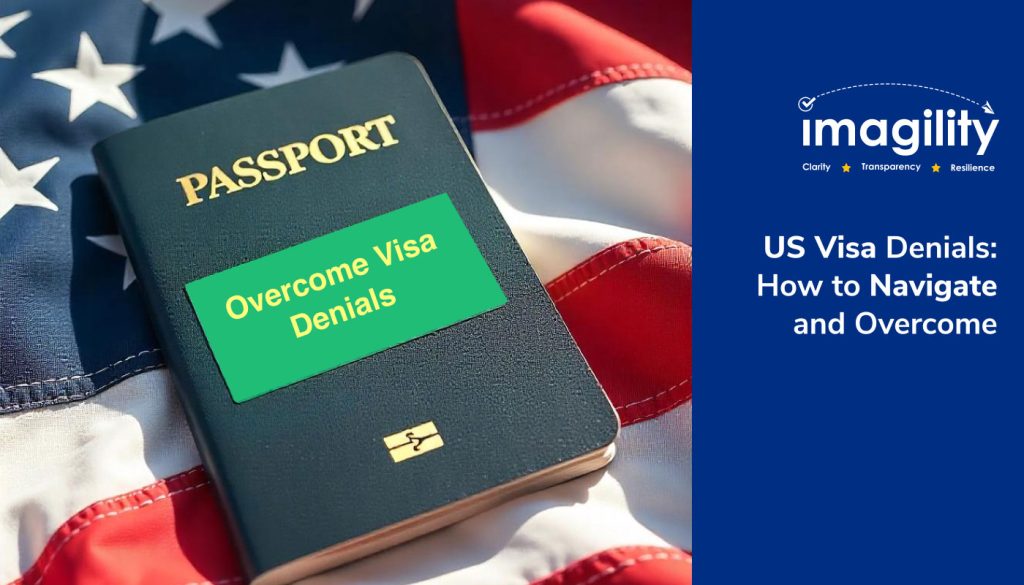US Visa Denials can be a disheartening experience for anyone hoping to visit, study, work, or immigrate to the United States. Facing a denial doesn’t necessarily mean that all hopes are dashed, but it does require understanding the reasons for the denial and taking appropriate steps to strengthen your case for future applications.
In this blog, we will explore strategies to help you navigate the complexities of US Visa Denials and increase your chances of success in reapplying.
Understanding Common Reasons for US Visa Denials
Common reasons for US Visa Denials often include incomplete or incorrect documentation, lack of strong ties to your home country, prior immigration violations, or inconsistencies in your application. These factors can lead the consular officer to believe you may not return to your home country after your visit.
Additionally, providing insufficient evidence of financial stability or failing to convincingly demonstrate the purpose of your trip can result in a denial. Misunderstanding or misrepresenting information on your application can also be a significant factor.
By pinpointing the specific reasons for your denial, you can focus on addressing these weaknesses in your reapplication.
How to Address Previous Visa Denials
Start by carefully reviewing the written explanation provided by the consulate or embassy, which details the reasons for your visa denial. Focus on correcting any inaccuracies or misunderstandings in your application. Ensure you provide complete and accurate documentation that directly addresses the issues raised in your denial.
If you were denied due to insufficient ties to your home country, gather stronger evidence to support your intent to return. Similarly, if financial stability was a concern, include updated financial statements or proof of new income sources.
Be transparent about your previous denial and clearly outline what steps you’ve taken to rectify the issues.
Preparing a Strong Reapplication
To improve your chances of success, gather and organize all required documents, ensuring they are complete and accurate. Highlight any significant changes in your circumstances, such as improved financial stability, stronger ties to your home country, or new job opportunities. Provide additional supporting documents and a detailed cover letter explaining these changes and how they address the issues that led to your previous denial.
Make sure your documentation is thorough and clearly presented to avoid any misunderstandings. This thorough preparation can make a significant difference in your reapplication.
Seeking Professional Guidance
Navigating the US visa process can be intricate, and professional guidance may provide a significant advantage. Immigration attorneys or visa consultants offer specialized knowledge to strengthen your application and address the specific issues that led to your previous denial. Their expertise includes ensuring your documentation is comprehensive and accurately presented, aligning your application with current immigration policies, and preparing you for the interview process.
They can also provide personalized advice tailored to your unique situation, helping you to avoid common pitfalls and misunderstandings. By leveraging their experience, you can enhance your chances of a successful reapplication, ultimately moving closer to achieving your visa goals.
Understanding the Waiver Process
In certain cases, a waiver might be necessary to overcome a US Visa Denial. Waivers are typically applicable when an applicant is inadmissible due to factors such as previous immigration violations or certain criminal convictions. To determine if you qualify for a waiver, you’ll need to closely examine the specific grounds of inadmissibility cited in your denial.
The waiver process often involves submitting extensive documentation to demonstrate that granting the waiver would not pose a risk and that the denial would cause undue hardship.
This may include affidavits, medical records, and other relevant evidence. It’s essential to follow the detailed instructions provided by the consulate or immigration office and ensure all forms and documents are meticulously prepared. Consulting with an immigration attorney can be particularly beneficial in navigating the complexities of the waiver process and increasing your chances of success.
Preparing for the Visa Interview
The visa interview is a critical part of the application process and an opportunity to address any concerns the consulate may have. Practice answering potential questions clearly and confidently. Dress appropriately and bring all necessary documentation, including any additional evidence that supports your case. Remember, the goal is to assure the officer of your eligibility and sincerity in your visa application.
Conclusion
Dealing with a US Visa Denial requires a strategic approach and a willingness to thoroughly address the issues that led to your initial rejection. The key to turning a denial into an approval lies in meticulous preparation and a clear understanding of the visa process. It’s crucial to pinpoint the exact reasons for your denial and strategically work on strengthening those weak points in your new application.
It is recommended to seek the guidance of immigration attorneys who can provide invaluable expertise tailored to your specific situation. These professionals can help you avoid common pitfalls, ensuring that your documentation aligns with current immigration policies and effectively prepares you for the visa interview.
You can easily get in touch with immigration attorneys through our Imagility platform, who have 30+ years of experience handling various visa petitions. You can contact us at sales@imagility.co or at +1 603 782 4622/+1 617 865 6588.









